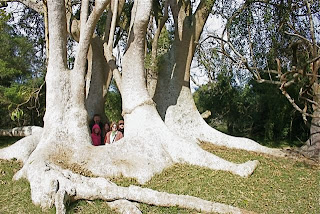Tuesday, September 30, 2008
Monte de Ombúes
 After staying in Cabo Polonio this July, we visited the nearby Monte de Ombúes.
After staying in Cabo Polonio this July, we visited the nearby Monte de Ombúes. An ombú is a native tree closely associated with gaucho culture and Uruguay's history. My mental image of an ombú has been a large, solitary tree surrounded by grasslands. (Not that I'd ever seen that; my actual experience with ombu trees was mostly of one particular tree growing in the middle of Boulevard España in Montevideo and a few others growing in city parks.) Ombú trees can have peculiar shapes with multiple trunks, merging branches, and frequent hollows.
The Monte de Ombúes promised something rare-- a forest of these unusual trees. The woods are on the shore of the Laguna de Castillos and the only access is by boat. Regularly scheduled tours depart from the bridge where the highway crosses the arroyo Valizas. Since July is the middle of winter in Uruguay, we were able to have a private tour.
Our boat floated slowly past pastures dotted with butia palms while gulls and egrets flew overhead. It's a great trip for birdwatchers; our guide pointed out ibis, teru-teru, chajá, cormorants, ducks, herons, kingfishers, and even flamingos. After about an hour, we reached the woods-- two groves of ombúes.
The trees themselves were impressive. Since it was winter, they were nearly leafless, focusing our attention on the trunks. Some of the trees were over 30 feet around and many had openings big enough for a person, or even a whole family, to enter. It was almost surreal seeing two trunks emerge separately from the stump and then recombine 10 or 20 feet higher.
This strange growth pattern is part of the ombu controversy: "Is it a tree or a shrub?" Until this visit, I'd always taken the tree side. The shrub argument seemed like it must be based on some obscure botanical definition. (Similar to the argument: "Is a tomato a fruit or a vegetable?") Based on everything I'd seen earlier, the ombú was a tree-- tall, solid, long-lived, trunk & branches, with leaves that dropped seasonally. How could it not be a tree?
Now I'm less sure. In the forest, we saw fallen ombúes and they weren't like fallen trees. Instead of being made of wood, the inside of an ombú looks like a cross between particle board and paper mache. Definitely not tree-like. New sprouts from the broken stumps furthered my confusion since they looked identical to the pokeweed that grows in my backyard in Michigan. The shrub proponents do have a point.
In any case, it was an interesting place to see. It's definitely a low-key trip-- something for nature-lovers; it would appeal to those Florida vacationers who choose Ding Darling over Miami Beach.
Labels: nature, Rocha, Uruguay
Comments:
<< Home
HI Chuck--it's so fun seeing your reports continue...
The Ombu excursion was one of the first I took in Uruguay, a very plesant boat ride and walk through the trees. I assume you also took the bird-watching nature walk across the river from the dock? Great little trip for folks needing a cheap break from the summer mania in Rocha and Punta del Este, or when the weather is cool...
Post a Comment
The Ombu excursion was one of the first I took in Uruguay, a very plesant boat ride and walk through the trees. I assume you also took the bird-watching nature walk across the river from the dock? Great little trip for folks needing a cheap break from the summer mania in Rocha and Punta del Este, or when the weather is cool...
<< Home
archives
- June 2006
- July 2006
- August 2006
- September 2006
- October 2006
- November 2006
- December 2006
- January 2007
- February 2007
- March 2007
- April 2007
- May 2007
- June 2007
- July 2007
- August 2007
- September 2007
- October 2007
- February 2008
- March 2008
- April 2008
- May 2008
- July 2008
- August 2008
- September 2008
- October 2008
- February 2009
- April 2009
- July 2009
- December 2009
- April 2010
- February 2012
- March 2023
- April 2023
- February 2026

